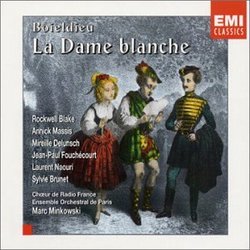| All Artists: François Adrien Boieldieu, Marc Minkowski, Ensemble Orchestral De Paris, Rockwell Blake, Annick Massis, Jean-Paul Fouchécourt, Laurent Naouri, Sylvie Brunet, Mireille Delunsch, Bernard Dehont Title: Boieldieu - La Dame blanche / Blake, Massis, Delunsch, Fouchécourt, Naouri, Brunet, Minkowski Members Wishing: 0 Total Copies: 0 Label: Angel Records Original Release Date: 1/1/2001 Re-Release Date: 10/2/2001 Album Type: Box set Genre: Classical Style: Opera & Classical Vocal Number of Discs: 2 SwapaCD Credits: 2 UPC: 724355635525 |
Search - François Adrien Boieldieu, Marc Minkowski, Ensemble Orchestral De Paris :: Boieldieu - La Dame blanche / Blake, Massis, Delunsch, Fouchécourt, Naouri, Brunet, Minkowski
 | François Adrien Boieldieu, Marc Minkowski, Ensemble Orchestral De Paris Boieldieu - La Dame blanche / Blake, Massis, Delunsch, Fouchécourt, Naouri, Brunet, Minkowski Genre: Classical
|
Larger Image |
CD Details |
CD Reviews"Viens, gentille dame..." Kicek&Brys | USA/UK | 01/28/2002 (5 out of 5 stars) ""Down with 'La Dame Blanche!'" was the rallying cry of Georges Bizet as he set to work on "Carmen", infuriated with the immense popularity of Boieldieu's opera and all the musical values it stood for. One of the biggest operatic successes of the 19th century (it clocked up 1669 performances in the hundred years that followed its premiere in 1825), "La Dame Blanche" has now virtually disappeared, along with almost all the other 'operas comiques' of its time by Herold, Auber and Adam. By a supreme historical irony, "Carmen", the least representative 'opera comique' of them all, is now the most famous surviving example of the genre. Reason enough then for us to consign "La Dame Blanche" to the limbo of unheard operas? Or did those Parisian audiences who flocked to see it in their thousands have a point after all? Conductor Marc Minkowski, never one to agree with conventional wisdom, thinks they did and this new recording (the first for almost forty years) should convince a few more people to investigate this attractive rarity. Boieldieu had been writing operas comiques in France and Russia for over twenty-five years when he came up with his masterpiece, "La Dame Blanche".Its librettist, Eugene Scribe, had an unfailing knack for sensing the mood of the fickle Parisian public. Composers practically begged him to write libretti for them, so they would be assured of a hit at the box office. Scribe decided to cash in on the craze for the novels of Walter Scott (a craze exploited by many, many other composers, including Rossini, Donizetti...and, later on, Georges Bizet himself in "La Jolie Fille de Perth"!). Scribe 'borrowed' from no less than five of Scott's works to come up with a crazily complicated plot about 'The White Lady' of Avenel Castle, a ghost who is supposed to protect the estate and its rightful owners. I won't attempt to summarise the plot here (try reading the synopsis in Kobbe's Opera Guide), let's just say it is the sort of thing that was parodied mercilessly by later satirists - but its craziness is part of the opera's charm. The supernatural element also allowed Boieldieu to exploit the other great musical fashion of the 1820s, the popularity of Weber's "Der Freischuetz", although "La Dame Blanche" doesn't sound the least bit 'Gothic', its magic is more of the delicate and wistful kind (one critic has referred to its 'moonlit grace'). As for local colour, it doesn't sound the least bit Scottish either, except for the variations on the folk melody 'Robin Adair' in the last act. What it does sound is very, very French: graceful, light and of immense melodic charm. Once heard, its popularity is easily understood - its tunes are infuriatingly catchy. It may plumb no great emotional depths, but its surface is delightful, with delicate accompaniments to the arias by flutes, harps and oboes. Boieldieu's main influences are the operas comiques of Gretry and Cherubini and, to a lesser extent, of Rossini. The great Italian himself was full of praise for the famous 'auction' ensemble at the end of the second act. Minkowski directs an energetic performance, far surpassing the previous recording, which was mostly a lifeless affair. Rockwell Blake, the Rossini tenor, copes well with the demands of the lead role, the soldier Georges Brown (who sings the only aria which is even half-remembered from this opera, the marvellous "Viens, gentille dame"), but his voice is too nasal to be beautiful. The two lead female roles are great: there is an unusual chance to hear Mireille Delunsch in a comic role, as the 'soubrette', Jenny; and Annick Massis (what has happened to her?) is very touching as 'La Dame Blanche' herself with her fresh, lyrical soprano. The only minor fault is that EMI's recording sounds rather shallow, to my ears at least. So "La Dame Blanche" may not be "Carmen" but for all its simplicity (even naivety), it still has the power to cast its spell over the modern listener. Adventurous explorers of the byways of French opera need not hesitate, but its charm might well captivate many other people too. (Brys)" What a pleasure to hear Domingo Warner Quijada | santiago,chile | 02/13/2010 (5 out of 5 stars) "the above reviewer said it all,i only would like to add the choruses,that i found excellent,and the spoken lines,this being an opera comique, that have the right feeling for this sweet opera,listen Fouchecourt talking, he is as good as singing,the same with Laurent Naouri, and the other singers.Said that, the rest you have read it above.Do not hesitate to buy if you like beatiful melodies and an entertaining and happy ending plot.After all,sometimes you have the right to get your spirits high , and this opera does that."
|

 Track Listings (19) - Disc #1
Track Listings (19) - Disc #1